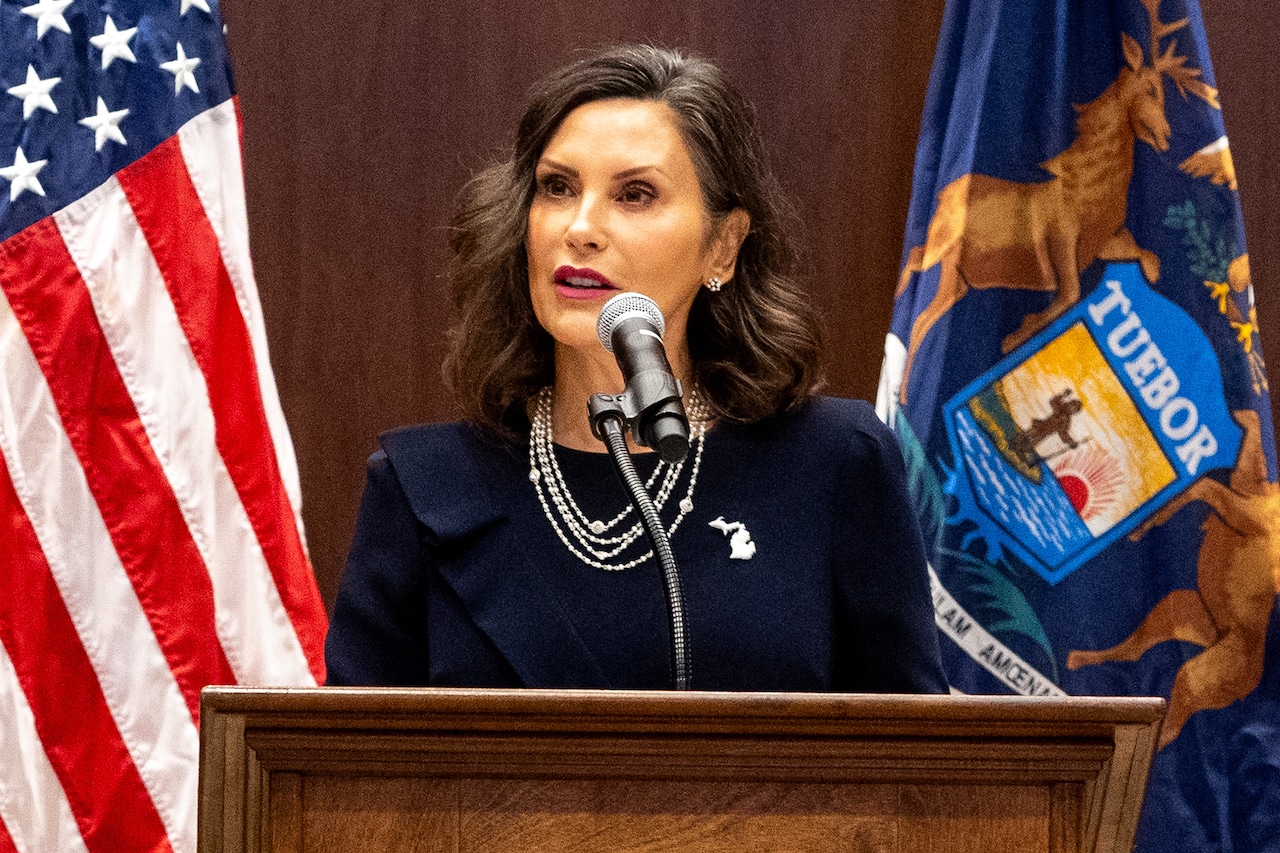Whitmer rejects House GOP budget, warns of ‘man-made storm of uncertainty’ from Trump tariffs

Gov. Gretchen Whitmer says she would not sign the House Republican budget that would eliminate thousands of full-time state government positions and slash $7.26 billion in state department spending.
Whitmer gave that repudiation of the House budget proposal during a speech Tuesday, Sept. 16, focused on the need to pass a state budget that invests in Michigan residents and businesses and protects them from the economic fallout from President Donald Trump’s tariffs.
Her speech comes just 15 days before Oct. 1, when the state government will shut down if lawmakers can’t agree on a budget for 2025-2026. The state’s new fiscal year begins that day.
From “stubborn” inflation and stagnating wage growth to falling credit scores and growing unemployment in manufacturing, Whitmer said these are “undeniable signs of an ailing economy.”
It’s a “man-made storm of uncertainty that hits Michigan hard,” Whitmer said, adding that while she’s doing everything to protect the state and create jobs, she can’t do it alone.
“Where is this uncertainty coming from? Two sources,” she said. “First, and most significantly, chaotic national tariff policies. And second, our state budget. Today, I want to talk about what we can and must do on both fronts.”
Whitmer said she sees a path forward in passing a budget on time that delivers the priorities of her office, the Democratic Senate majority and the Republican House majority.
“Governing means compromise,” Whitmer said. “A budget deal can deliver on the priorities that I’ve been fighting for: investing in our kids, fixing our roads, helping us compete, keeping people safe. It can deliver on the Senate’s important objectives and help us make sure that we protect Medicaid, feed kids at school, support moms and babies. And it can deliver on the House’s goals too. They want to trim spending, they want to fix local roads and increase transparency.
“All of that is doable. If the Legislature sends me a budget that reflects these shared priorities, I will sign it.”
The last time the state faced a shutdown was in 2019. While a shutdown was avoided, the Whitmer administration was prepared to shut down road construction, state parks, Secretary of State branches and more.
Budget negotiations between Whitmer’s office, the House and the Senate have stalled this year amid funding and policy differences, lower revenue projections and a desire for a long-term road-funding plan.
While Whitmer and Senate Democrats have proposed spending increases for state departments, House Republicans last month introduced a $54.6 billion government spending plan that would slash millions of dollars from nearly every state department and cut thousands of government positions.
A majority of the positions proposed to be axed are “ghost employees” that remain on the payrolls despite not being filled, according to House Republicans.
House Republicans have said their budget cuts “waste, fraud and abuse” and redirects those dollars to priorities like public safety and a $3.4 billion plan to repair the state’s crumbling bridges and roads.
In the hours leading up to Whitmer’s speech, several department leaders in the governor’s administration broke their silence on the impacts of the House Republican budget proposal, sending out press releases that declared the GOP plan would harm government services and operations. These department leaders serve as appointees in the governor’s administration.
Previously, state departments contacted by MLive directed inquiries about the Republican budget to the State Budget Office, which declined to provide specific department-by-department budget impacts.
In responding to Whitmer’s speech, Senate Majority Leader Winnie Brinks, D-Grand Rapids, implied that House Republicans want to take the state closer to a government shutdown in hopes of getting their budget priorities enacted.
“While the governor and I both are experienced in passing balanced budgets on time, there are those who would rather wait out the clock and shut down the state in hopes of getting what they want,” Brinks said. “That’s not how we do business, and I will not be pressured into giving up on the things Michiganders care about – regardless of party affiliation — like school meals for their kids, support for new moms and babies and access to quality, affordable health care and roads. I’m proud to have a partner in this fight with Gov. Whitmer, and we’re going to get the job done.”
House Speaker Matt Hall, R-Richland Township, said the House Republican budget proves the state can fix its roads and bridges by eliminating “fraud, waste and abuse” in government. He said he thinks he and Whitmer can strike a deal on the budget.
“House Republicans identified billions of dollars in waste, including thousands of phantom employees in our state departments and hundreds of grants for things like puppet art theaters and barbershop quartets,” Hall said. “Our state has been funding that nonsense while our local roads and bridges continue to fall apart. It’s not right.”
Passing a state budget this year isn’t just about avoiding a shutdown or investing in Michigan. It’s also about protecting the state’s businesses and residents from the economic damage being caused by Trump’s tariffs on dozens of the U.S.’ trading partners, Whitmer said.
Michigan’s largest trading partners, Canada and Mexico, have tariffs of 35% and 25%, respectively, imposed on their goods. Those countries are key to Michigan’s auto industry, with some auto parts crossing the Canadian border multiple times during production and being taxed at each crossing, Whitmer has previously said.
“In some cases, they aren’t just scaling back,” Whitmer said. “With tariffs on Canada and Mexico higher than the ones on Japan, auto companies are considering building cars and products entirely overseas to pay one tariff on one product. Dangerously ironic, the national tariff chaos does the opposite of the administration’s goal.
“Companies are cutting, not creating jobs in Michigan. Costs are going up, not down. The price of a new car rises by thousands. Or your dollar won’t go as far.”
Whitmer said tariffs, when used strategically and precisely, can encourage investment and job growth in Michigan and the U.S. On Tuesday, she again likened Trump’s approach to tariffs to a hammer, rather than a scalpel.
“Companies that have invested in Michigan for decades brought up uncertainty caused by our national tariff policy,” Whitmer said. “They want to invest in Michigan, but tariffs are keeping them on the sidelines. Uncertainty breeds paralysis and paralysis costs jobs.”
Whitmer has talked with Trump several times about providing some relief on tariffs, but ultimately the state has no power over the policy. That’s why it’s important, she said, that the state swiftly passes a budget that continues progress on fixing roads and investments in education and public safety.
“While we can’t control the global tariff war, we must do what we can to make life a little easier for Michiganders and reduce uncertainty,” she said. “As Michiganders watch the news, they tend to ask a simple question – what does this mean for me and my family? Failing to get this done means more uncertainty, higher costs and less jobs.”



